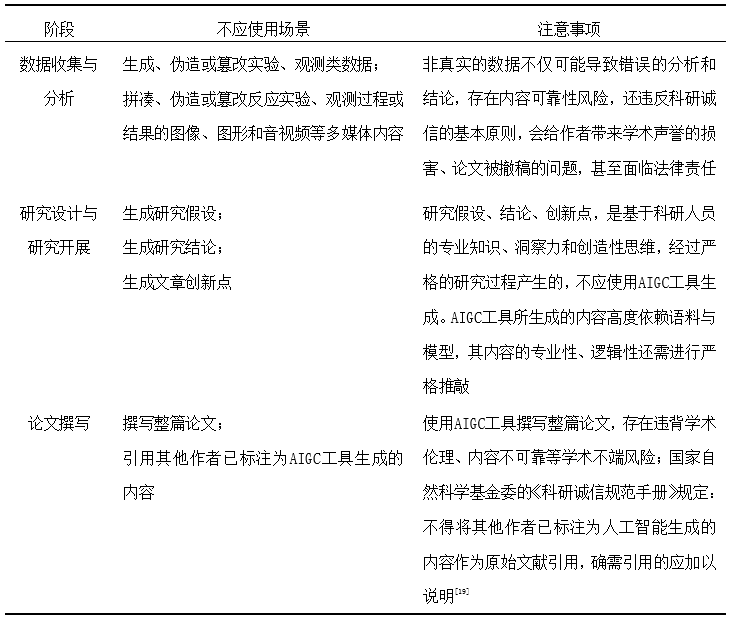 PDF(1292 KB)
PDF(1292 KB)


 PDF(1292 KB)
PDF(1292 KB)
 PDF(1292 KB)
PDF(1292 KB)
学术研究中使用AIGC工具的风险审视与应对策略研究
The Risk Review and Countermeasures of Using AIGC in Academic Research
[目的/意义]分析学术研究中使用AIGC工具可能存在的风险,对规避风险的策略展开研究,为科研人员合规使用AIGC工具提供参考和借鉴。[方法/过程]梳理国内外学术领域有关AIGC应用的政策规定,归纳分析使用AIGC的主要风险,结合科研人员的学术研究过程,提出规避风险的策略以及在不同阶段使用AIGC的可行性建议。[结果/结论]科研人员使用AIGC工具面对的风险主要集中在输入内容的安全性、输出结果的可靠性、学术伦理风险以及潜在法律风险。科研人员应提高风险意识,理解政策规定,明确不同研究阶段和场景的使用边界,规范使用行为,以确保AIGC工具在学术研究中发挥积极作用。
[Purpose/Significance] This study aims to analyze the potential risks of using AIGC tools during academic research, study the strategies to avoid these risks and provide references and guidance for researchers so that they can use AIGC tools in compliance with rules and laws. [Method/Process] This study sorted out the policies and regulations related to the application of AIGC in academic fields at home and abroad, summarized and analyzed the main risks of using AIGC. Then, combined with the researchers’ academic research process, risk avoidance strategies and feasible suggestions for using AIGC at different stages were proposed. [Result/Conclusion] The risks of using AIGC tools for researchers mainly focus on the security of input content, the reliability of output results, academic ethical risks, and potential legal risks. Researchers should enhance their risk-awareness, understand the policy regulations, know the usage boundaries for different research stages and scenarios very well, and regulate their usage behavior to ensure that AIGC tools play a positive role in academic research.

AIGC / 生成式人工智能 / 学术研究 / 风险分析 / 应对策略
AIGC / Generative AI / academic research / risk analysis / countermeasure
| [1] |
国家网信办,国家发展改革委,教育部,等.生成式人工智能服务管理暂行办法[EB/OL].[2023-12-20]. https://www.gov.cn/zhengce/zhengceku/202307/content_6891752.html.(Cyberspace Administration of China, National Development and Reform Commission, Ministry of Education, et al. Interim Measures for the Management of Generative Artificial Intelligence Services[EB/OL].[2023-12-20]. https://www.gov.cn/zhengce/zhengceku/202307/content_6891752.html.)
|
| [2] |
中国科学技术信息研究所,爱思唯尔,施普林格·自然,等.学术出版中AIGC使用边界指南[EB/OL].[2023-12-20]. https://www.istic.ac.cn/html/1/284/338/1701698014446298352.html.(Institute of Scientific and Technical Information of China, ELSEVIER, SPRINGER NATURE, et al. Guideline on the Boundaries of AIGC Usage in Academic Publishing[EB/OL].[2023-12-20].https://www.istic.ac.cn/html/1/284/338/1701698014446298352.html.)
|
| [3] |
和军,杨慧. ChatGPT类生成式人工智能监管的国际比较与借鉴[J].湖南科技大学学报(社会科学版),2023,26(6):119-128.(HE J,YANG H. International comparison and reference on ChatGPT-like Generative Artificial Intelligence Regulation[J].Journal of Hunan University of Science and Technology(Social Science Edition),2023,26(6):119-128.)
|
| [4] |
European Parliament. Artificial Intelligence Act[EB/OL].[2023-12-20].https://www.europarl.europa.eu/doceo/document/TA-9-2023-0236_EN.pdf.
|
| [5] |
闫宏秀,宋胜男.双重脆弱性与适度信任:从ChatGPT到Sora[J/OL].新疆师范大学学报(哲学社会科学版)[2024-04-21]. https://doi.org/10.14100/j.cnki.65-1039/g4.20240408.001.(YAN H X,SONG S N.Dual vulnerability and moderate trust: from ChatGPT to Sora [J/OL]. Journal of Xinjiang Normal University (Philosophy and Social Sciences Edition) [2024-04-21]. https://doi.org/10.14100/j.cnki.65-1039/g4.20240408.001.)
|
| [6] |
李艳. 三星ChatGPT泄密事件及启示 [J]. 保密工作, 2023 (9): 65-68. (LI Y. Samsung due to ChatGPT leakage incident and its inspiration [J]. Confidentiality, 2023, (09): 65-68.)
|
| [7] |
ZHAO R , LI X, CHIA Y K, et al. Can ChatGPT-like generative models guarantee factual accuracy? On the mistakes of new generation search engines[EB/OL].[2024-02-26]. https://arxiv.org/abs/2304.11076.
|
| [8] |
孙滔.发表3天被撤稿!中国作者用AI生成论文插图,每幅都荒谬[EB/OL].[2024-02-27].https://news.sciencenet.cn/htmlnews/2024/2/517714.shtm.(SUN T. Published for 3 days and was withdrawn! Chinese authors use AI to generate paper illustrations, and each one is absurd[EB/OL].(2024-02-20)[2024-02-27].https://news.sciencenet.cn/htmlnews/2024/2/517714.shtm.)
|
| [9] |
ELISABETH B. The rat with the big balls and the enormous penis – how Frontiers published a paper with botched AI-generated images[EB/OL].[2024-2-27].https://scienceintegritydigest.com/2024/02/15/the-rat-with-the-big-balls-and-enormous-penis-how-frontiers-published-a-paper-with-botched-ai-generated-images/.
|
| [10] |
种晓明. AIGC赋能出版业背景下版权监管新路径研究[J]. 科技与出版, 2023(8): 96-104.(ZHONG X M. A study on the new path of copyright supervision under the background of AIGC empowering the publishing industry[J]. Science-technology & publication, 2023 (8): 96-104.)
|
| [11] |
Nature. Why Nature will not allow the use of generative AI in images and video[EB/OL].[2023-12-20].https://www.nature.com/articles/d41586-023-01546-4.
|
| [12] |
THORP H H. ChatGPT is fun, but not an author[J].Science.2023,379(6630):313.
|
| [13] |
The lancet. Information for authors[EB/OL].[2023-12-20].https://www.thelancet.com/pb/assets/raw/Lancet/authors/tl-info-for-authors.pdf.
|
| [14] |
Elservier. The use of generative AI and AI-assisted technologies in writing for Elsevier[EB/OL].[2023-12-25].https://www.elsevier.com/about/policies-and-standards/the-use-of-generative-ai-and-ai-assisted-technologies-in-writing-for-elsevier.
|
| [15] |
Taylor & Francis Group. Taylor & Francis editorial policies on authorship[EB/OL].[2023-12-25].https://authorservices.taylorandfrancis.com/editorial-policies/defining-authorship-research-paper/.
|
| [16] |
ame5. arXiv announces new policy on ChatGPT and similar tools[EB/OL].[2023-12-25].https://blog.arxiv.org/2023/01/31/arxiv-announces-new-policy-on-chatgpt-and-similar-tools/.
|
| [17] |
王威.《布莱奇利宣言》:人工智能国际合作监管的新起点[J].服务外包,2023(12):46-52.(WANG W. Bletchley Declaration: a new starting point for international cooperation and regulation of artificial intelligence[J].China outsourcing,2023(12):46-52.)
|
| [18] |
科技部监督司.负责任研究行为规范指引(2023)[EB/OL].[2023-12-22].https://www.most.gov.cn/kjbgz/202312/t20231221_189240.html.(Supervision Department of the Ministry of Science and Technology. Guidelines for responsible research code of conduct (2023)[EB/OL].[2023-12-22].https://www.most.gov.cn/kjbgz/202312/t20231221_189240.html.)
|
| [19] |
国家自然科学基金委员会.科研诚信规范手册[EB/OL].[2023-12-22].https://www.nsfc.gov.cn/publish/portal0/tab442/info91294.html.(National Natural Science Fundation of China. Handbook of scientific research integrity standards[EB/OL].[2023-12-22].https://www.nsfc.gov.cn/publish/portal0/tab442/info91294.html.)
|
| [20] |
胡彬.人工智能可否被用来写医学论文[N].健康报,2024-01-17 (5). (Hu B.Can AI be used to write medical papers[N].Health, 2024-01-17 (5))
|
| [21] |
Silvia Vaccino-Salvadore.Exploring the Ethical Dimensions of using ChatGPT in language learning and beyond[J].Languages,2023,8(3):191.
|
| [22] |
MCADOO T. How to cite ChatGPT[EB/OL].[2024-01-29].https://apastyle.apa.org/blog/how-to-cite-chatgpt.
|
| [23] |
MLA style center. How do I cite generative AI in MLA style?[EB/OL].[2023-12-25]. https://style.mla.org/citing-generative-ai/.
|
| [24] |
全国信息与文献标准化技术委员会.信息与文献 参考文献著录规则: GB/T 7714-2015 [S].北京:中国标准出版社,2015.(Information and Documentation. Information and documentation—rules for bibliographic references and citations to information resources: GB/T 7714-2015[S].Beijing: Standard Press of China,2015)
|
张艳丽:确定研究思路,撰写论文初稿,修改论文与定稿;
管玉燕:相关政策资料收集整理,修改论文和校对格式;
宛 雪:调研、分析AIGC 工具,进行数据分析和解释,校对论文;
赵晶浩:调研、论证AIGC 工具生成原理和存在风险。
/
| 〈 |
|
〉 |